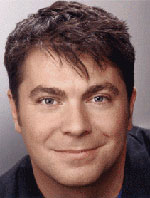Author urges families to have a plan in culture war
By Stephanie Engelman (Special to The Criterion)
 Look around you and think about what “normal” has become for children and teenagers today.
Look around you and think about what “normal” has become for children and teenagers today.
If video games, exposed midriffs, cell phones, apathy and “What’s in it for me?” come to mind, you’re not alone.
Next, ask yourself: “Do I want my children or grandchildren to be ‘normal’ ”?
Best-selling author and popular motivational speaker Matthew Kelly believes that, for most of us, the answer is a resounding “no!”
On Oct. 5, Kelly gave an hour-long presentation at St. Joan of Arc Church in Indianapolis based on his book Building Better Families. About 450 people filled the church for the program sponsored by the Indianapolis North Deanery parishes.
Packed full of valuable content combined with witty humor, Kelly’s presentation outlined the steps that parents must take to nurture children who will confidently pursue the best versions of themselves.
The author urged the audience to consider that modern culture has no vision for the human person, but instead rests on a foundation of consumerism.
This culture encourages people to believe that possessions will bring them happiness rather than weighing them down, Kelly said. He also believes that, in today’s world, the family is at war with this materialistic culture.
Unfortunately, most families are completely unaware that they are involved in a culture war and this ignorance is the surest path to defeat, Kelly said. To win, one must know that he or she is at war and recognize the enemy.
Most important in the culture war, he emphasized, “Don’t leave your family to chance. You have to have a plan.”
The author suggested that parents’ first strategy in the war against culture is to ask the right questions, beginning with the question that will lead to abundant life: “God, what do you think I should do?”
He joked that, unlike cars, “kids come standard with navigation.” The best part is that “when they go in the wrong direction, God recalculates.”
Another vital question, Kelly said, is, “Will this help me to become the best version of myself?”
Parents should consider this question when their children ask if they can go to a party, join an activity or even eat a cookie. As they mature, children will learn to ask this question for themselves, helping them to make better decisions in life, Kelly said.
As a mother of three children, Karin Bell, a member of St. Malachy Parish in Brownsburg, has begun implementing this practice with her children in the weeks since she heard Kelly’s presentation.
Each night before bed, she asks her oldest two children, “What did you do today to become a better version of yourself?” Responses from her
6-year-old and 4-year-old have been increasingly thoughtful, including “I read a book to my sister” and “I didn’t get upset at my brother when I could have.”
Kelly’s second countercultural strategy is prayer. He emphasized that “the Christian life is not sustainable without daily prayer [and] it is important for families to pray together.”
A good way to start is by working to enrich the Sunday worship experience, Kelly noted. He suggested taking time as a family during the week to read and discuss the upcoming Sunday’s Gospel reading. Through repetition, the message will become much more meaningful to children when they hear it at Mass, he said.
Hearing about the importance of prayer had a strong impact on Karin Bell’s husband, Robert, who, in addition to being the father of three young children, is the chief financial officer of an Indianapolis-based company.
Bell has made sure to pray for his family nightly, and is increasingly aware that his children will imitate the choices they see their father make in daily life.
“My children are watching, and they’ll remember and imitate what I do and say,” he said. “Unless we want to have children who are similar to those raised in secular society, we must act now to make them different.”
The third and final strategy that Kelly urged parents to pursue is to foster a spirit of service.
“We don’t get happy by not having to do anything,” he said. Instead, families must remember that “we grow by doing something for others.”
Kelly finished by issuing a challenge to “go home and think about what you as families are doing that is countercultural.
“Do people in the grocery store look at you and say, ‘Wow, just look at her. She’s so peaceful and pleasant. She must be Catholic!’ ?”
Or at your workplace, Kelly said, “Do people say, ‘Just look at how he goes about his work. He must be Catholic!’ ”
It may seem unlikely, the author said, but this is the culture we should strive to create—one that sets us apart through our faith.
“Christianity is about attraction, not promotion,” Kelly said. “Nothing is more attractive than holiness.”
To be attractive in our holiness, he said, we must “live differently, love differently and work differently.”
(Stephanie Engelman is a member of St. Malachy Parish in Brownsburg.) †
 Look around you and think about what “normal” has become for children and teenagers today.
Look around you and think about what “normal” has become for children and teenagers today.